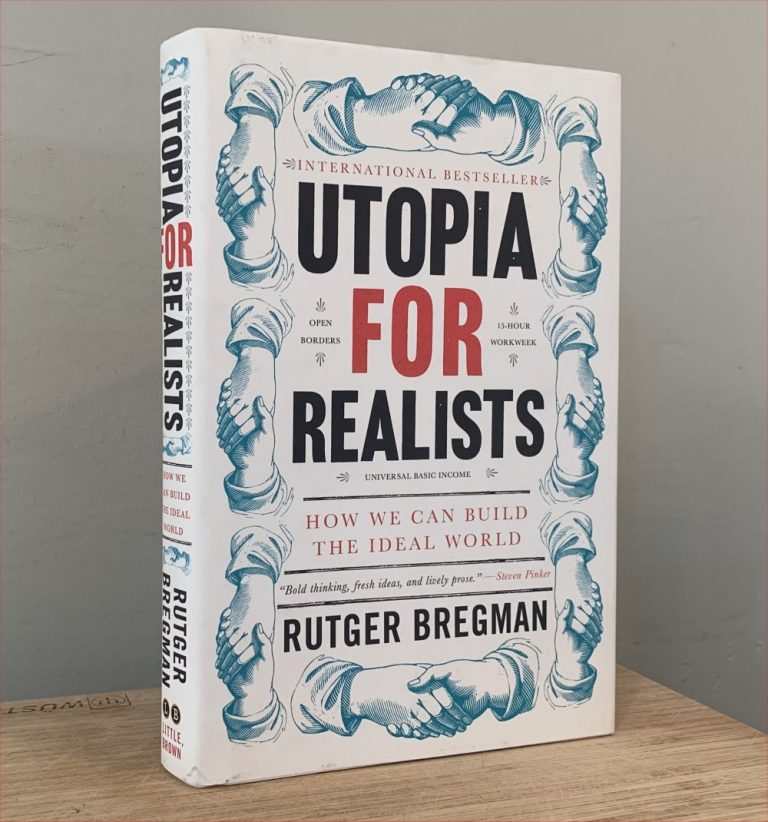 Bregman, Rutger. 2017. Utopia for Realists: How We Can Build the Ideal World. Little, Brown. ***
Bregman, Rutger. 2017. Utopia for Realists: How We Can Build the Ideal World. Little, Brown. ***
This Dutch thinker outlines ways to make the future a better place, with evidence about why they would work: implement a universal income; abandon the Gross Domestic Product (GDP) as a measure of social health; try not to obsess about having more and more stuff, or about the dogma of having to work for a living; open the borders to reduce poverty; be open to radical ways of thinking (but beware the cognitive dissonance of conspiracy theories); and keep the Overton Window in mind, how ideas once dismissed as crazy can come to pass. (post)
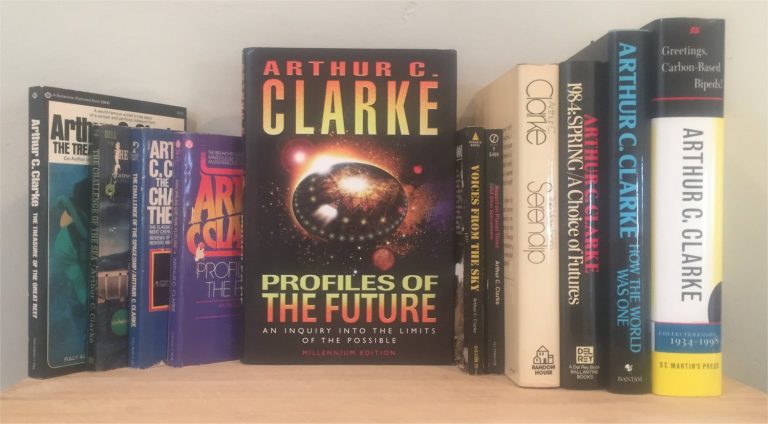 Clarke, Arthur C.. 1999. Profiles of the Future: An Inquiry in the Limits of the Possible. Gollancz. ***
Clarke, Arthur C.. 1999. Profiles of the Future: An Inquiry in the Limits of the Possible. Gollancz. ***
Clarke’s nonfiction book speculating about future technology and science was first published in 1962 and revised three times, the last in 1999. The 1999 version begins with Clarke’s famous “three laws,” the last of which is “Any sufficiently advanced technology is indistinguishable from magic.” After chapters on hazards of prediction, “Failure of Nerve” and “Failures of Imagination,” which look back at previous prophecies, Clarke moves on with chapters about various topics: transportation, overcoming gravity, speed, the future of space, time, resources, manufacturing, and so on. Clarke’s most conspicuous miss is his anticipation of Ground Effect Machines, which he thought would revolution global transport and render coastal ports obsolete; the idea survives as only a few hovercraft. The book ends with a “Chart of the Future,” mapping specific inventions and discoveries to specific dates, with a few predictions on the mark, many others overly-optimistic. (post)
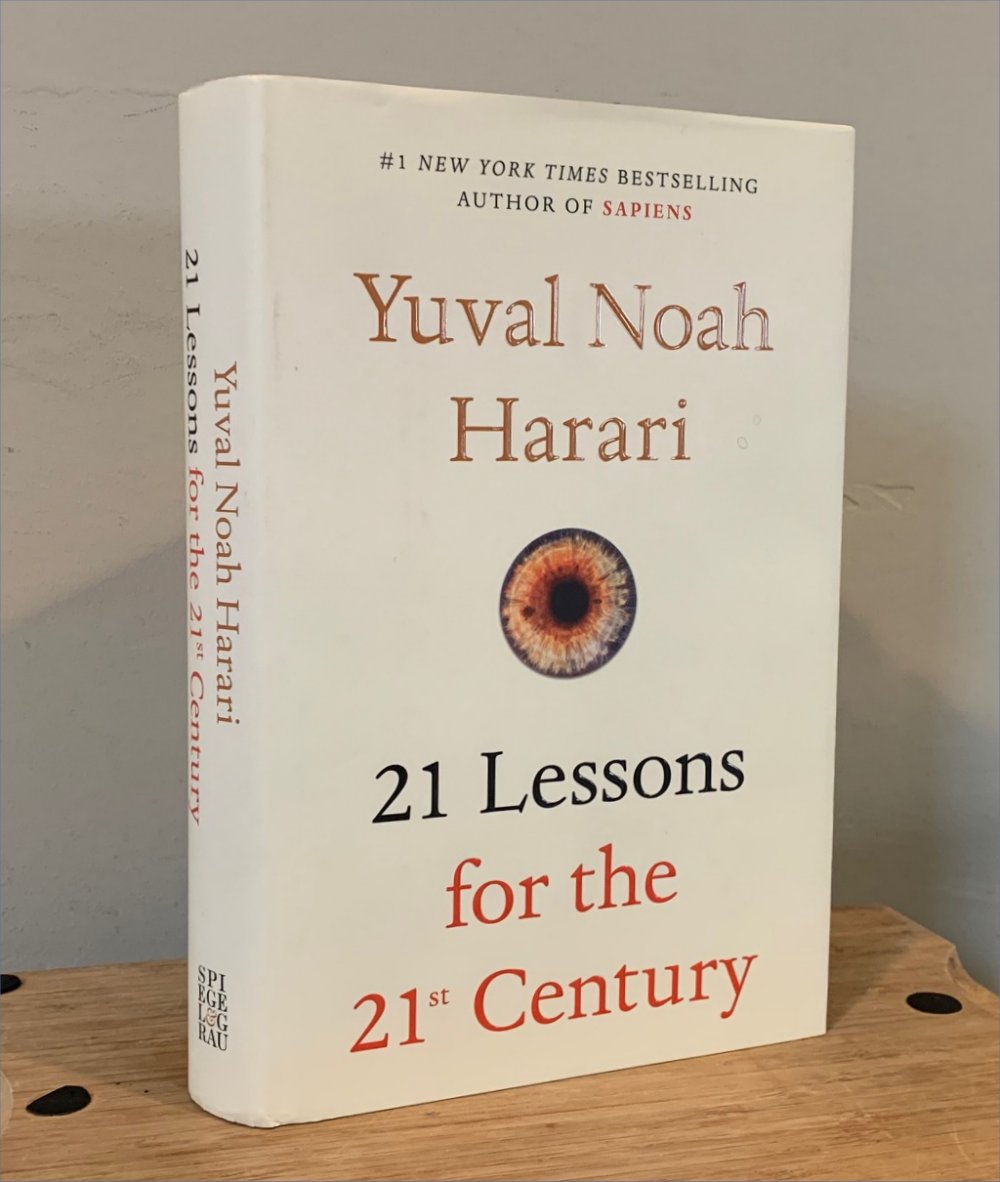 Harari, Yuval Noah. 2018. 21 Lessons for the 21st Century. Spiegel & Grau. *****
Harari, Yuval Noah. 2018. 21 Lessons for the 21st Century. Spiegel & Grau. *****
Harari’s third book covers ideas from his second, HOMO DEUS, about where humanity is headed this century. The five main parts consider the merger of infotech and biotech; how to react by controlling fears and being humble; how to make sense of the world; and what our new story should be; and finally what we can say about the meaning of life. Harari echoes Snyder in how the “liberal story” seemed to have won over the fascist and communist stories, in the 20th century, but how — after 9/11, the economic crisis in 2008, and Trump and Brexit in 2016, this is in doubt. Liberalism is better, and yet it’s bringing about ecological collapse. Topics include post-work societies, big data, inequality, how online communities haven’t worked out, how there is actually just one civilization in the world, and thus the perils of nationalism, which can’t by itself address climate change or avoid nuclear war. Going on: how religion is part of the problem rather than a solution; issues of immigration. How terrorists kill few people but inspire panic among billions. How human stupidity might well launch new wars. How one’s own culture is not the most important in human history (with example of Harari’s Jewish background). And about god and morality, secularism and its consequences, how people know less than what they think, how our sense of justice might be out of date, post-truth fake news, science fiction (this is about the irresponsibility of several SF films), the need for education in a world of change. And then — a long chapter about the “meaning of life,” how religions provide stories that provide the two conditions needed, yet how their stories are not true; how the issue isn’t the meaning of life, but how to stop suffering. And finally: how the author’s personal solution to all this is meditation (a final chapter that echoes that of Sam Harris’ THE END OF FAITH). (post #1; post #2; some quotes)
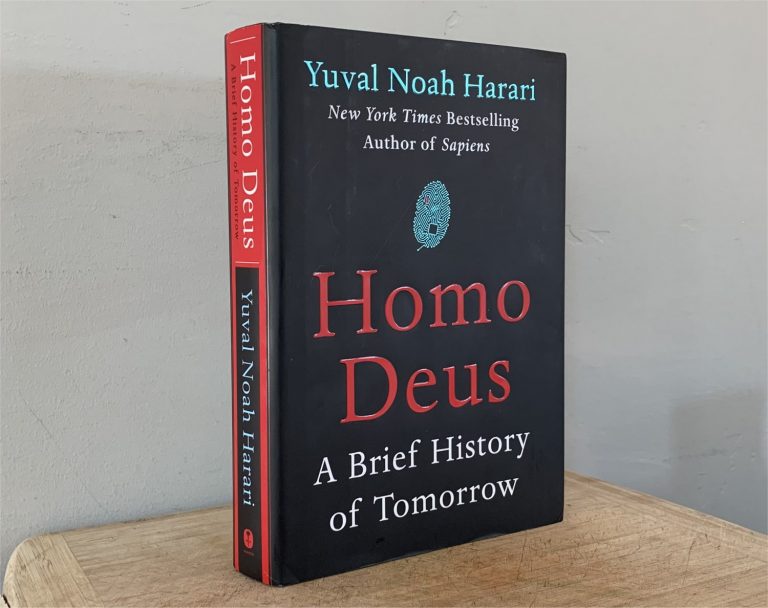 Harari, Yuval Noah. 2017. Homo Deus: A Brief History of Tomorrow. Harper. *****
Harari, Yuval Noah. 2017. Homo Deus: A Brief History of Tomorrow. Harper. *****
In effect a sequel to Sapiens. Harari reflects on three problems of human history, famine, plague, and war, and considers what happens next, proposing immortality, happiness, and divinity, and how the ideal of humanism, which as a religion (again, I find his simplistic use of some terms problematic) is flawed. Modern history is a deal between science and humanism, but it can’t go on forever, because of resources, or a collapsing ecology. While there is no serious alternative to the liberal package of individualism, human rights, democracy, and the free market, some of its presumptions may not be true, e.g. free will. Three ways liberalism might be made obsolete include humans being replaced by robots and thus becoming unemployed, with useless people spending their lives taking pharmaceuticals and playing computer or VR games. What we should be paying attention to: in the short term, immigration and refugees. Over the decades: global warming, and inequality. In the long term: considering to what extent organisms are algorithms and whether intelligence is decoupling from consciousness. As with the first book, this is a fascinating, provocative big picture book taking fresh looks and new perspectives on many familiar ideas. (post)
 Keen, Andrew. 2018. How to Fix the Future. Atlantic Monthly. ** 1/2
Keen, Andrew. 2018. How to Fix the Future. Atlantic Monthly. ** 1/2
A breezy book in the Thomas L. Friedman mode as the author talks to various experts around the world who grapple with the problems of high-tech’s effects on society. Contra Silicon Valley’s free market libertarianism, Keen describes, with examples (Estonia, Singapore, Oakland), five tools to make things better: regulation, competitive innovation, social responsibility, worker and consumer choice, and education. (post)
- MacAskill, William. 2022. What We Owe the Future. Basic Books. –
Notes forthcoming
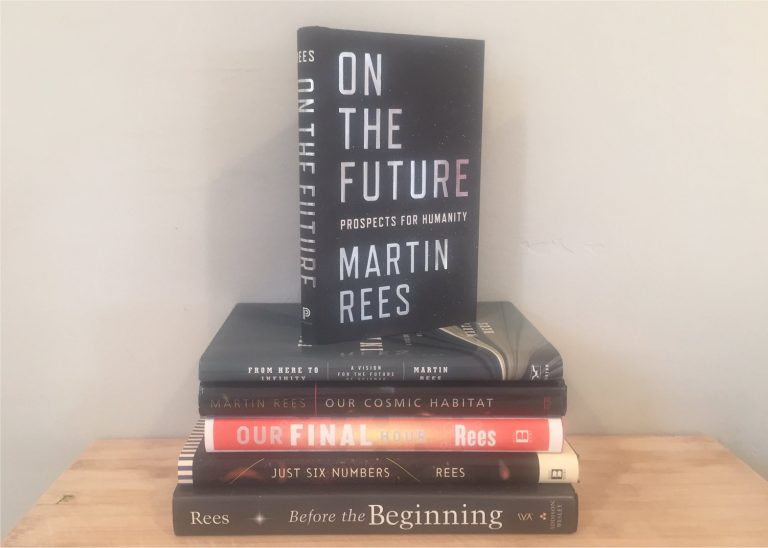 Rees, Martin. 2018. On the Future: Prospects for Humanity. Random House. ****
Rees, Martin. 2018. On the Future: Prospects for Humanity. Random House. ****
This British astronomer and astrophysicist’s 2018 book is based on a series of 2010 lectures, and was preceded by the 2003 Our Final Hour, which explored various ways humanity might be doomed. This book has a broader scope. Its theme is “The flourishing of the world’s growing population depends on the wisdom with which science and technology is deployed.” He reviews existential threats like climate change and nuclear war, then consider humanity’s future on themes of biotech, cybertechnology, job loss, universal income, and the risk of global networks. Then humanity in a cosmic perspective: Sagan’s pale blue dot; Darwin; a post-human era; SETI. The limits of science: how complexity emerges from simple laws; whether there are things we’ll never know because our brains are incapable of understanding them; issues of God and religious rituals. Finally on the diversity of science, how science is the one culture that’s global, and how threats need to be tackled internationally. (post)
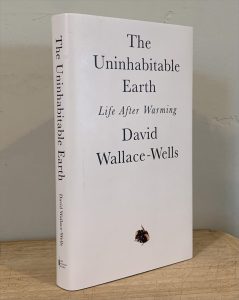 Wallace-Wells, David. 2019. The Uninhabitable Earth: Life After Warming. Tim Duggan Books. ****
Wallace-Wells, David. 2019. The Uninhabitable Earth: Life After Warming. Tim Duggan Books. ****
This book isn’t about the science of why we think global warming is happening, but about the consequences of it, currently and in the future. Not just sea-level rising, but also heat waves, famines, the drowning of coastal cities, increased wildfires, the normalizing of natural disasters, the loss of fresh water, the dying of the oceans, increased air pollution, increased plagues, economic collapse, conflicts among nations. More broadly: it will require new kinds of storytelling, capitalism, technology, politics. Our “modern world” may be just a blip in history. There is almost no chance we’ll avoid this. And while such projections typically go out to the year 2100, the following century will be much worse. But don’t succumb to despair: we know what to do. Get off fossil fuels, eliminate the bitcoin footprint, correct inefficiencies in present systems. Move beyond the Western idea of conquering the earth. (summary part 1; part 2)
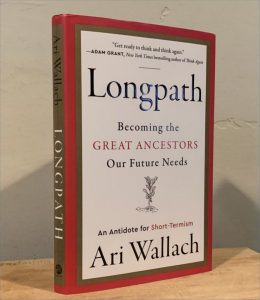 Wallach, Ari. 2022. Longpath: Becoming the Great Ancestors Our Future Needs. HarperOne. *** 1/2
Wallach, Ari. 2022. Longpath: Becoming the Great Ancestors Our Future Needs. HarperOne. *** 1/2
A modest little book with great ambitions to change the way people think. It’s about “long-termism,” the need to anticipate future outcomes in order to deal with climbate change and other big problems. (He’s adjacent to William MacAskill’s work but not aligned with it.) Our minds evolved for short-term thinking to deal with immediate threats, when a single human lifespan was a far as philosophers thought about. Now we need to think more creatively, distinguishing between arbitrary goals and true goals. To what end is our spcies? Maybe not the Second Coming, or the Singularity, but simply collective flourishing. Look for “trim tabs,” small changes that have big effects, even something so simple as smiling and looking people in the eye whenever possible. Morality is flexible; we can shape it. And realize that if our species does endure, we are now only in a very early stage of humanity’s history. (post)
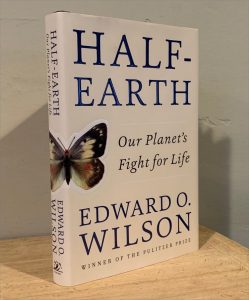 Wilson, Edward O.. 2016. Half-Earth: Our Planet’s Fight for Life. Liveright. ***
Wilson, Edward O.. 2016. Half-Earth: Our Planet’s Fight for Life. Liveright. ***
This book expresses an important idea that has become part of Wilson’s legacy: that to prevent mass extinctions and preserve Earth’s biodiversity, we must save half of the planet’s land-surface from human development. There is a detailed list of suggested “best places in the biosphere” worth preserving, among them the Redwood Forests of California. Outside this core, much of the book is stage-setting, with overviews of life on Earth, what naturalists do, tours of ecosystems, and how to think about humanity in the context of the planet’s history. (post)





